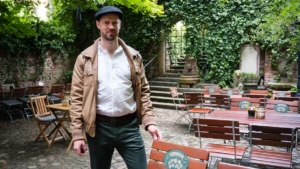Von Luisa Zenker
Dresden. Der Appell von Dachdeckermeister Jörg Dittrich an die Landesparteien ist deutlich: „Die Wirtschaft muss Chefsache werden“, sagt der Präsident des Zentralverbandes des Deutschen Handwerks. Dabei geht es ihm nicht nur um „Bürokratie-Abbau“, sondern auch um die Wertschätzung des Handwerks, leidet es doch an einem schlechten Image. Die Handwerkskammer fordert deshalb akademische und berufliche Bildung gleich zu werten. Damit das in der Gesellschaft ankommt, hat die Handwerkskammer zum Tag des deutschen Handwerks eine Tour durch Dresden organisiert.
In einem blau angestrichenen Bus ging es zu drei Hidden-Champions: einer Tischlerei, einem Bäcker und einem Autolackierer. Sie zeigen Erfolgsgeschichten mitten in Dresden, sind doch immer weniger Personen im Handwerk aktiv. Während 2021 noch 35.389 Handwerksbetriebe in Sachsen schufteten, sind es nun 258 Firmen weniger, heißt es aus der aktuellen Bilanz vom Statistischen Landesamt. Die Beschäftigtenzahl sank um rund 3.300 Mitarbeitern auf 282.500 Handwerker und Handwerkerinnen.
Dittrich macht deshalb auf eine bestimmte Personengruppe aufmerksam: Ende 2023 gab es in Deutschland rund 626.000 junge Menschen zwischen 15 und 24 Jahren, die sich weder in Schule noch in Beschäftigung, Ausbildung oder Studium befanden. Er sorgt sich, dass diese „mit 35 Jahren im Bürgergeld landen“ und will sie fürs Handwerk zu gewinnen. Er wisse auch, dass sich der Fachkräftebedarf nicht nur innerhalb Deutschlands decken lässt und fordert deshalb „qualifizierte Zuwanderung“. Dresden trage dazu bei: In der Region haben 48 Azubis mit vietnamesischer Herkunft eine Ausbildung begonnen. Kritisiert wird neben bürokratischen Hürden aber auch immer wieder die fehlende Willkommenskultur in den Betrieben. „Nicht das Handwerk, die Gesellschaft muss sich ändern“, sagt Dittrich darauf, der zum Tag des Handwerks aber den Fokus auf drei Talente in der Region legt. Ein Bäcker, ein Autolackierer und eine Möbelmanufaktur zeigen, warum sie trotz der Probleme erfolgreich sind.
Die digitalen Möbelmacher

© ronaldbonss.com
Alle Möbel, die bei Patrick und Thorsten Henseler entstehen, werden zuerst digital angefertigt. Das Brüderpaar kann Digitalisierung. Vor vier Jahren haben die beiden die Tischlerei Redwood in Dresden-Leuben gegründet. Sie setzen deshalb nicht nur auf Säge und Schleifgerät, sondern auch auf Social Media und Google-Werbung. „Instagram weiß, welche Personen kaufbereit sind.“ Hier wirbt das Brüderpaar in ganz Deutschland um Neukunden für ihr Steckenpferd: Massivholzmöbel – aus Eiche, Esche, Erle.
Interessierte können die Möbelstücke im digitalen 3D-Wohnzimmer unter die Lupe nehmen und anschließend online bestellen. Ab dem entscheidenden Mausklick dauert es drei bis vier Wochen, ehe der Stuhl im eigenen Zimmer steht. Innerhalb dieser Zeit werden die Möbel individuell hergestellt und ausgeliefert. 30 Prozent macht das digitale Geschäft vom Umsatz aus, man will auf 50 Prozent hochgehen. „Unser Schlüssel zum Erfolg ist der Online-Auftritt“, so der Bauingenieur Thorsten Henseler
Das Brüderpaar ist in Namibia aufgewachsen, wohin ihre Eltern ausgewandert sind. Die Berufsausbildung wollten sie lieber in Deutschland machen: „Die deutsche Berufsausbildung öffnet jede Tür“, sagt Patrick Henseler. Er hat in Dresden Tischlermeister gelernt.
In dem Start-up arbeiten bereits sieben Beschäftigte. Normalerweise bilden die beiden auch Azubis aus, doch das haben sie dieses Jahr ausgesetzt. „Es gibt zu viele Pflichtlehrgänge“, so Patrick Henseler, der seine Lehrlinge durch Berufsschule, Urlaub und Weiterbildungen im ersten Lehrjahr zwar bezahlt, aber kaum sieht.
Die Lackierer für Tesla

© ronaldbonss.com
Auf seine Kinder habe Jens Bertholdt nie Druck ausgeübt, sagt der Fahrzeuglackierermeister. Dennoch haben sich beide Söhne für eine Karriere in seiner Autowerkstatt entschieden. Sohnemann Felix habe zuvor noch Mediengestalter gelernt. Dabei hat er dann mit einem Gehalt von damals fünf Euro die Stunde den Vater gefragt, was man als Lackierer verdient. Der Stundenlohn schwankt aktuell bei 15 bis 20 Euro, so Jens Berthold, der nun mit seinen beiden Söhnen den Handwerksbetrieb leitet. Der 59-Jährige selbst hat den Betrieb von seinem Vater übernommen. Dieser wiederum hatte 1972 das Unternehmen mit drei Beschäftigten gegründet, um Wartburg und Trabant zu lackieren. Nach und nach konnte sich das Unternehmen in der Nachbarschaft Dresden-Reick ausbreiten und auf 40 Leute anwachsen. Fünf Meisterbriefe hängen in den Büroräumen, der jüngste Sohn Franz war bester Meister in seinem Jahrgang.
Doch auch der Lackierer kommt an den Energiekosten nicht vorbei. Im Sommer könne er sich durch die Photovoltaikanlage auf dem Dach autark versorgen, im Winter bei Minusgraden muss die Lackierkabine aber dennoch die ganze Zeit auf 20 Grad gehalten werden. Warum der Betrieb so eine Erfolgsgeschichte schreibt, hat offenbar damit zu tun, dass sie mit der Zeit mitgegangen sind. Als einer der wenigen Autowerkstätten in Dresden gehört er zu denen, die Teslas reparieren dürfen. Seit 2019 hat das Unternehmen zudem die Werkstatt digitalisiert. Von der Schadensmeldung über den Reparaturstand bis hin zur Fertigstellung, läuft alles digital ab.
Die Hochwasser-Bäckerei

© ronaldbonss.com
„Wir sind total untergegangen“, sagt Bäckermeister Carsten Wiederhold. Der 70-Jährige kann sich gut an das Elbehochwasser 2002, 2006 und 2013 erinnern, stand die Backstube am Laubegaster Ufer doch völlig unter Wasser.
An zehn Hotels liefert die Dresdner Bäckerei: „Da können sie schwer vermittel, dass es keine Brötchen gibt, weil der Bäcker unter Wasser steht“, so Wiederhold. Die Bäckerei aus Laubegast hat deshalb die Tradition hinter sich gelassen und ist nach dem Hochwasser an die Wirtschaftsförderung der Stadt herangetreten. Damals habe es „Klick gemacht“, erinnert sich der Bäckermeister an den Juni-Abend, als er mit seinem Sohn zur Hochwasser-Wache auf dem Balkon saß. Noch in der Nacht habe er mit ihm besprochen, wie es weitergehen soll. 2015 zogen die Produktionsräume dann ins sichere Reick, von wo aus das Laubegaster Stammhaus am Elbufer beliefert wird.
Doch nicht nur die Fluterlebnisse machen das Unternehmen besonders: Zählt es doch zu den ältesten Bäckereien Dresdens. Gegründet 1865 leitet nun Konditormeisterin Christiane Steiner mit ihrem Bruder Norbert Wiederhold den Bäcker in der fünften Generation. Auch der zwölfjährige Sohn habe bereits den Wunsch, Bäcker zu werden. Das familiäre Umfeld würden die Mitarbeiter schätzen, so die Bäckermeister. Neben mehr als 30 Brötchensorten, die das Unternehmen jeden Tag bäckt, hat nun die Adventsvorbereitung begonnen. 400 Stollen haben sie schon in den Ofen geschoben. Fragt man Christiane Siemank zu den größten Sorgen sagt sie: „Bis vorgestern, war es die Flut.“ Durch den Umzug und den Hochwasserschutz der Stadt aber ist das Wasser – zum Glück – weit weg geblieben. Da bleibt nur noch eine Sorge: „Die Bürokratie – wofür brauchen die diese ganzen Zahlen?“, fragt sie. Davon kann auch Handwerkspräsident Jörg Dittrich ein Lied singen. Er wünscht sich von der neuen Landesregierung „Bürokratie-Abbau“. Was das im Einzelnen bedeutet? Vergabegesetz, Lieferkettengesetz, Arbeitszeiterfassung – nennt er als Beispiele.








